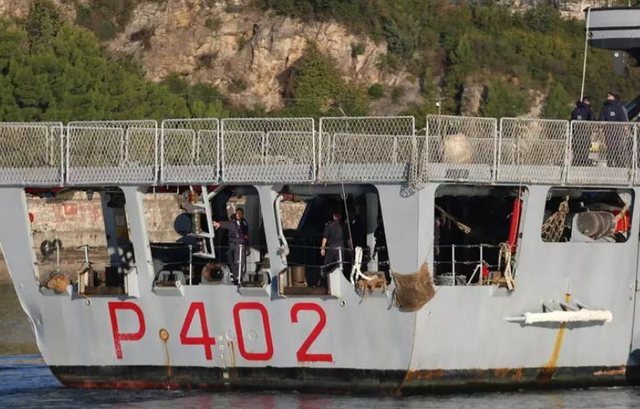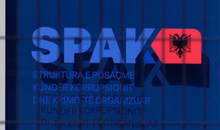
 Flash News
Flash News
Gunfire in Tirana, 4 people injured
Murder of Gjovalin Prendit in Lezha, police: 64-year-old was executed by gunfire under unclear circumstances
His father was executed this evening in Lezha/ Who was Roan Brahimi, the assassination suspect and rival of Ervis Martinaj?
Assassinations in Lezha Plain, Roan Brahimi's father is killed
The first 600 ballots from the diaspora arrive in Albania
Deportations from Italy to Albania officially begin, first 15 arrive, transport continues

An Italian military ship with 15 migrants has departed from the port of Brindisi towards Albania, marking the next transport within the framework of the agreement between the Italian and Albanian governments for the management of migrants outside the EU territory. According to official sources, another group of 25 migrants is expected to depart this evening towards our country, bringing the total number of people who will be placed in the Gjadri camp to 40.
These immigrants, who have received deportation orders from Italian territory, will be housed in the special center in Gjadra, now transformed into a repatriation facility according to the new draft approved by Giorgia Meloni's government.
In January of this year, Albania hosted the third and largest group of migrants at the reception center in Shëngjin, after two previous cases in October and November 2024. In both cases, Italian courts had not upheld the detention of asylum seekers in Albanian facilities, temporarily suspending the implementation of the agreement.
The legal disputes mainly relate to the definition of asylum seekers' countries of origin and the lack of a common list of "safe countries" among EU states. The Italian government has defended its position, emphasizing the need for personalized lists for each member state.
On December 30, 2024, the Court of Cassation in Italy ruled in favor of the Italian executive, confirming that the designation of safe countries is the exclusive competence of the Ministry of Foreign Affairs and other relevant ministries, and not of judges in individual cases.
The agreement for the construction and operation of these centers was signed in 2023 between Italian Prime Minister Giorgia Meloni and Albanian Prime Minister Edi Rama. It has drawn strong criticism from international human rights organizations, which see it as an attempt to shift the migration problem to economically and legally weaker countries.
The Italian opposition has called this project costly and inefficient, with a cost of around 800 million euros over five years, while emphasizing that it represents only a small part of the total flow of migrants entering Italy each year.
Meanwhile, the European Commission and several EU leaders have expressed interest in the Italian-Albanian model, considering it as an alternative for managing immigration outside the union's borders.
Latest news


Assassination in Tirana, police react: 4 injured in Trauma, two of them minors
2025-04-17 22:34:30
Gunfire in Tirana, 4 people injured
2025-04-17 22:16:15

Tirana Incinerator, Lala: Officials were punished as if they stole a chicken
2025-04-17 21:50:29
Wealth Zodiac: Who has the money magnet?
2025-04-17 21:47:18





Assassinations in Lezha Plain, Roan Brahimi's father is killed
2025-04-17 20:29:59

The first 600 ballots from the diaspora arrive in Albania
2025-04-17 19:52:59

Farmers who make BÉ-eee and farmers of the EU!
2025-04-17 19:30:47

Tobacco: 0% tax for freelancers, PD with a clear plan for the middle class
2025-04-17 19:07:05

Car hits 9-year-old child in Pogradec
2025-04-17 18:42:15
Alizoti accuses SPAK: It has failed in supervising the elections
2025-04-17 18:31:42
Mental health alert: Work without limits, mind under pressure
2025-04-17 18:09:04
Two vehicles collide, 29-year-old dies in Tirana
2025-04-17 18:01:45
Rama from Dibra: Half of Albanian men are syrians, the rest vote for the DP!
2025-04-17 17:55:58
Top Ukrainian, European and American leaders meet in Paris
2025-04-17 17:45:35

"Metamorphosis", the Court takes time on the way to judge the defendants
2025-04-17 17:24:50

Trump's tariffs could bring Putin closer to peace
2025-04-17 17:06:27
Accident with 3 injured on the Kukes-Krume axis, 27-year-old arrested
2025-04-17 16:41:24
The fires that are burning Albania
2025-04-17 16:36:38

The husband of Rama's former minister in Kosovo is arrested again
2025-04-17 16:14:07
This is the country with the highest road accident death rate in the EU
2025-04-17 16:00:37

ECB cuts rates to 2.25% amid Trump trade war
2025-04-17 15:38:26

They hit the wife and mother, two arrested in Lezha for domestic violence
2025-04-17 15:13:15

Who is the new Prime Minister of Serbia, Gjuro Macut?
2025-04-17 14:43:03
Court hearing on 'Sterilization' case postponed
2025-04-17 14:40:04
Knife injury in Milot, caused by wrong overtaking
2025-04-17 14:33:42
William Levy released from prison
2025-04-17 14:16:25
Këlliçi: Rama uses sexist and offensive language towards women and girls
2025-04-17 14:05:30

Not a campaign, but a story/ Garo 'takes' ASHM candidates to another level
2025-04-17 13:41:08



Berisha: We are facing the philosophy of extorting businesses and citizens
2025-04-17 13:07:36
Fight breaks out in Tirana, 8 arrested, injured man hit with pistol butt
2025-04-17 12:57:23

Unjust dismissals from the administration, court decisions lingered
2025-04-17 12:29:59

Nuredin Dumani threatens lawyer, "Golden Bullet" hearing interrupted
2025-04-17 12:13:18



With guns and cocaine, thieves flee from police, crashing into officers' car
2025-04-17 11:35:27



Iran says it is ready to address US concerns about its nuclear program
2025-04-17 10:56:49
Navigation of small craft and fishing vessels suspended
2025-04-17 10:45:32
The hearing at the GJKKO for the "5D" file is postponed again
2025-04-17 10:33:43
Zeno's Arrow and Albania in the EU
2025-04-17 10:21:47
Teacher arrested for sexually harassing underage students in Librazhd
2025-04-17 10:07:07

Accusations of collaboration with Rama, Soros rejects comments to "Fox News"
2025-04-17 09:45:32
Foreign exchange/ How much foreign currencies are bought and sold today
2025-04-17 09:42:44
Electoral State/SP accused of misusing institutions for election campaign
2025-04-17 09:30:32

Last year, 20 operators were excluded from the right to win tenders.
2025-04-17 09:09:34
Two vehicles collide at the Tapiza Bridge, one woman dies
2025-04-17 09:01:26
7 tourists rescued after being trapped in Nivica Canyon
2025-04-17 08:41:31
Report: Albania, the only country in the region without industrial policies
2025-04-17 08:32:04
Horoscope, what do the stars have in store for you?
2025-04-17 08:17:21
Temperatures continue to remain high, weather forecast for this Thursday
2025-04-17 08:02:35
Morning Post/ In 2 lines: What mattered yesterday in Albania
2025-04-17 07:49:39

Rama will avoid taking stock at all costs, Berisha has a substantive campaign
2025-04-16 22:35:34


A cartridge at the scene and one injured, details of the shooting in Tirana
2025-04-16 21:34:33
Prices from Lushnja to Tirana, the trader earns more than the producer
2025-04-16 21:31:15


Berisha: Beketi refused to become Rama's slave, you pay 110 million euros now
2025-04-16 20:51:58
Gunfire at the Lake Dam in Tirana
2025-04-16 20:37:22

Accident in Kukës-Krumë, three injured after two cars collide
2025-04-16 20:25:23
Turkey hosts Black Sea security talks
2025-04-16 20:08:45



Mercury enters Aries on April 16: How it affects each zodiac sign
2025-04-16 19:13:37



